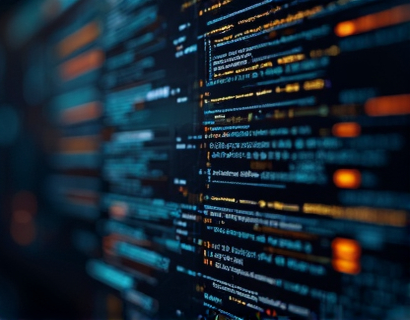AI and Crypto: Revolutionizing Fintech Through Intelligent Solutions for the Future
The intersection of artificial intelligence (AI) and cryptocurrency is redefining the landscape of fintech, offering unprecedented opportunities for efficiency, security, and personalization. This transformative fusion is not just a trend but a fundamental shift in how we perceive and interact with digital finance. As tech-savvy crypto enthusiasts and innovators, understanding this synergy is crucial for navigating the future of finance.
The integration of AI into cryptocurrency and blockchain technology has opened new avenues for innovation. AI's capabilities in data analysis, pattern recognition, and predictive modeling are being harnessed to enhance various aspects of fintech. From improving transaction security to optimizing investment strategies, AI is playing a pivotal role in shaping a more intelligent and responsive financial ecosystem.
Enhancing Security with AI
One of the most significant benefits of AI in cryptocurrency is the enhancement of security measures. Traditional financial systems often struggle with fraud and cyber threats, but AI brings a new level of protection. Machine learning algorithms can detect anomalies and suspicious activities in real-time, significantly reducing the risk of fraudulent transactions. This proactive approach to security is essential in an environment where digital assets are increasingly targeted by malicious actors.
Moreover, AI-driven security solutions can adapt and learn from new threats, ensuring that defenses remain robust against evolving cyber threats. This dynamic security model is particularly important for cryptocurrency exchanges and wallets, where the stakes are high and the potential for loss is significant. By leveraging AI, these platforms can offer users a higher degree of confidence in the safety of their digital assets.
Optimizing Transactions through AI
AI also plays a crucial role in optimizing cryptocurrency transactions. Blockchain technology, while revolutionary, can be slow and costly, especially during periods of high network congestion. AI algorithms can analyze transaction patterns and network conditions to identify the most efficient times and methods for sending and receiving cryptocurrencies. This optimization not only reduces transaction fees but also speeds up the process, making cryptocurrency more practical for everyday use.
Additionally, AI can facilitate the development of more efficient consensus mechanisms. By analyzing vast amounts of data, AI can help identify bottlenecks and suggest improvements to the underlying protocols of blockchain networks. This could lead to faster block times, lower energy consumption, and a more scalable infrastructure, all of which are critical for the widespread adoption of cryptocurrency.
Personalized Financial Services
Perhaps one of the most exciting applications of AI in fintech is the ability to deliver personalized financial services. In the realm of cryptocurrency, this means tailored investment advice, customized portfolio management, and personalized risk assessment. AI algorithms can analyze an individual's financial behavior, market trends, and personal goals to provide insights and recommendations that are uniquely suited to their needs.
For instance, AI-powered financial advisors can monitor market conditions and suggest optimal times to buy or sell cryptocurrencies based on predictive analytics. This level of personalization is particularly valuable for retail investors who may lack the expertise to navigate the complexities of the crypto market on their own. By demystifying the investment process, AI can empower more people to participate in the crypto economy.
Smart Contracts and Automated Processes
Smart contracts, a key feature of blockchain technology, are being enhanced by AI to create more sophisticated and automated financial processes. AI can analyze the conditions and outcomes of smart contracts, ensuring that they execute as intended and adapt to changing circumstances. This automation reduces the need for intermediaries, lowering costs and increasing efficiency.
For example, in the realm of decentralized finance (DeFi), AI can optimize lending and borrowing processes by dynamically adjusting interest rates based on market conditions and borrower profiles. This not only makes financial services more accessible but also more equitable, as AI can help identify and mitigate biases in traditional credit scoring systems.
Fraud Detection and Compliance
Another critical area where AI is making a significant impact is in fraud detection and regulatory compliance. The anonymous nature of cryptocurrency transactions has historically made it a haven for illicit activities. However, AI-driven analytics can sift through vast amounts of transaction data to identify patterns indicative of fraud or money laundering. This real-time monitoring helps regulatory bodies and financial institutions maintain compliance and protect users from malicious activities.
AI can also assist in the Know Your Customer (KYC) and Anti-Money Laundering (AML) processes by automating the verification of user identities and transaction histories. This not only streamlines the onboarding process but also ensures that only legitimate users access the platform, enhancing overall security and trust.
Market Prediction and Trading Bots
The ability of AI to predict market trends is another game-changer for cryptocurrency investors. AI algorithms can process and analyze vast datasets, including historical price data, news sentiment, and social media trends, to forecast market movements. This predictive power is being leveraged to develop advanced trading bots that can execute trades autonomously based on AI-generated insights.
These bots can operate 24/7, reacting to market changes in real-time and executing trades at optimal moments. For both individual investors and institutional players, this level of automation can lead to significant gains and reduced emotional decision-making, which is often a source of loss in volatile markets.
User Experience and Interface Enhancements
Beyond backend processes, AI is also transforming the user experience in cryptocurrency and fintech applications. AI-driven chatbots and virtual assistants can provide instant support and guidance, helping users navigate complex financial concepts and platform features. These AI-powered interfaces can adapt to user preferences and behavior, offering a more intuitive and user-friendly experience.
Additionally, AI can analyze user feedback and interaction data to continuously improve the design and functionality of fintech applications. This iterative process ensures that the tools and services offered are not only technologically advanced but also aligned with the needs and expectations of users.
Challenges and Considerations
While the integration of AI and cryptocurrency offers numerous benefits, it also presents challenges that must be addressed. One of the primary concerns is the ethical use of AI, particularly in terms of data privacy and algorithmic transparency. Ensuring that AI systems are designed and implemented with robust ethical guidelines is essential to maintain user trust and comply with regulatory requirements.
Another challenge is the technical complexity involved in integrating AI with existing blockchain infrastructure. Developing scalable and efficient AI solutions that can operate seamlessly on decentralized networks requires significant research and development. Collaboration between AI experts and blockchain developers is crucial to overcome these technical hurdles.
Future Prospects
Looking ahead, the synergy between AI and cryptocurrency is poised to drive further innovation in fintech. As AI technologies continue to advance, we can expect even more sophisticated applications in areas such as quantum-resistant cryptography, decentralized autonomous organizations (DAOs), and cross-chain interoperability. These developments will not only enhance the functionality and security of blockchain networks but also open up new possibilities for financial inclusion and innovation.
The future of fintech is undoubtedly intertwined with the evolution of AI and cryptocurrency. By embracing these technologies, we can create a more efficient, secure, and personalized financial landscape. For tech and finance innovators, the potential is vast, and the journey ahead is both exciting and transformative.










































